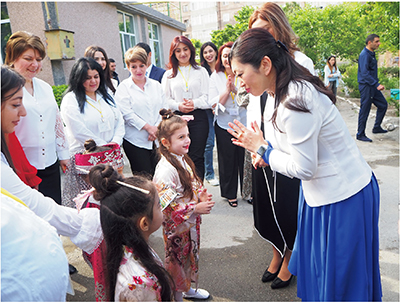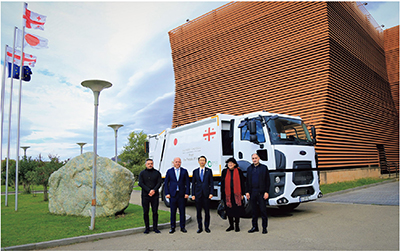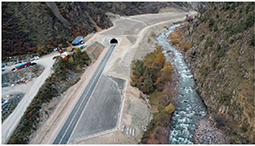6 Central Asia and Caucasus
The Central Asian and Caucasus region is located in a geopolitically important place linking East Asia, South Asia, the Middle East, Europe, and Russia. Its development and stability hold great significance for those of Eurasia as a whole. Enjoying abundant natural resources, such as oil, natural gas, uranium, and rare earths, being positioned on an important route for the transportation of energy, and with pipelines having been installed from Kazakhstan and other Caspian Sea areas to Europe, Russia, and China, the region is of strategic importance from the perspective of energy security as well. In particular, since Russia’s aggression against Ukraine in February 2022, it has been attracting attention as a point of connectivity between Europe and East Asia without passing through Russia.
Central Asian and Caucasus countries have worked toward transitioning to a market economy and economic development since their independence in 1991. However, they still face challenges such as the modernization of aging economic infrastructure established during the former Soviet Union era, human resources development in support of the transition to a market economy, and the development of social systems, including health and medical care. Meanwhile, because the region is vulnerable not only to the geopolitical influence of major countries in its vicinity but also to the security situations in neighboring countries, there are concerns about social unrest associated with the reintegration of returnees from conflict areas such as Afghanistan. Furthermore, to reinforce connectivity, it is essential to enhance logistics through improving the customs system and to implement effective anti-drug measures through strengthening border controls.
Japan provides cooperation toward the free, open, and sustainable development of the Central Asian and Caucasus region with a focus on priorities, such as developing economic and social infrastructure, supporting democracy and market economy development, strengthening border control, and implementing anti-drug measures.
● Japan’s Efforts

In May, then Parliamentary Vice-Minister for Foreign Affairs Yoshikawa visiting No. 13 Kindergarten of Etchmiadzin Municipality in Armenia, whose building was renovated with assistance from Japan

A garbage collection truck provided to Georgia through a Grant Assistance for Grass-Roots Human Security Project in support of improving sanitary conditions and environmental conservation for residents in the Mtskheta Municipality, Georgia
Japan launched the “Central Asia plus Japan” dialogue in 2004 and since then, considering Central Asia as a partner in maintaining and strengthening the free and open international order, it has been promoting regional cooperation in support of the contribution to peace and stability in the region. The 12th Tokyo Dialogue of “Central Asia plus Japan” was held in Tokyo in March 2023, in the form of an open symposium under the theme of “Connectivity with Central Asia and the Caucasus.” The meeting was attended by practitioners from Central Asia as well as Azerbaijan and Georgia, which are an important region linking Central Asia to the sea, along with representatives of the World Customs Organization (WCO), which is involved in international cooperation in the customs sector, relevant Japanese ministries and agencies, and Japanese companies. Participants reported on the current status and challenges of regional cooperation in their respective countries, and engaged in lively discussions with Japanese counterparts who presented their corporate perspectives and case studies from Japan.
As for Japan’s relationship with the Caucasus countries, in May 2023, then Parliamentary Vice-Minister for Foreign Affairs Yoshikawa visited Armenia, Georgia, and Azerbaijan, and concurred with each country to enhance regional connectivity and strengthen support for human resources development.
From 1993 to 2022, as part of its support for human resources development mainly in the fields of health, agriculture, and education, Japan has accepted approximately 12,100 trainees from Central Asian and Caucasus countries while dispatching approximately 3,300 experts to those countries. Moreover, Japan supports the development of human resources necessary for state-building efforts, including through the implementation of the Project for Human Resource Development Scholarship (JDS), which is a study-in-Japan program for young government officials and others, the Development Studies Program, and the development of human resources for business at the Japan Center for Human Resources Development.
In the area of basic social services, Japan provides assistance in strengthening the health and medical care systems in countries that have been significantly affected by the spread of COVID-19.
In recent years, a flashpoint for ethnic tensions has become apparent in the Central Asia and Caucasus region. In September 2023, Azerbaijan started military activities in Nagorno-Karabakh, and as a result of this, more than 100,000 persons have been displaced to Armenia. Given this situation, Japan delivered Emergency Grant Aid of 2 million US dollars to the displaced persons of Nagorno-Karabakh in Armenia and Azerbaijan through international organizations.
Additionally, in light of the situation in neighboring Afghanistan, Japan assists in strengthening the system of public order in the areas near the Tajik border with Afghanistan through establishing border security offices, delivering equipment for the digitalization of border control, and organizing personnel training. Furthermore, in five Central Asian countries sharing borders with Afghanistan, Japan not only provides skills training and employment support to youths returning from conflict areas or migrant work so that they can integrate into society but also offers assistance in stabilizing society and improving security, such as the promotion of social engagement through community activities.
Featured Project 10
Kyrgyz Republic
Road Disaster Risk Reduction to Protect Citizens from Avalanches
Project for Avalanche Protection on Bishkek-Osh Road
Grant Aid (March 2016 – November 2023)
In the Kyrgyz Republic, a landlocked country, the domestic road network not only serves as a basic infrastructure for people’s daily lives, but also plays a role of an economic infrastructure that supports trade with neighboring countries. In particular, the road linking the capital Bishkek and Osh City, the country’s second-largest city, is the only main arterial road connecting the north and south of the country. The road, connecting Russia and Afghanistan through Kazakhstan and Kyrgyz, forms a part of the Asian Highway Network international corridor. The road, which is used by hundreds of thousands of vehicles throughout the year, runs through steep mountainous terrain and was in a dangerous condition due to snowstorms and natural disasters such as avalanches that make passage difficult. Against this backdrop, Japan supported the construction of the first Snow ShedNote 1 in the country through grant aid in the area where avalanches occur most frequently. In constructing the Snow Shed, Japan utilized the technology developed in heavy snowfall regions of Japan and worked to strengthen avalanche countermeasures on mountainous roads in the Kyrgyz Republic.
It is expected that the Snow Shed will ensure traffic safety in this section of the road during winter and help maintain smooth traffic throughout the year. With the improvements, both domestic and international access to neighboring countries is expected to be enhanced, which leads to the facilitation of logistics.
Construction workers from Japan and the Kyrgyz Republic cooperated and completed the construction work despite the severe weather conditions. The Government of the Kyrgyz Republic named this tunnel the “Kyrgyz Republic-Japan Friendship Tunnel” as a token of its gratitude for Japan’s support.
Japan will continue to support the development of economic and social infrastructure that will help the Kyrgyz Republic grow and diversify its industries and improve its export capabilities.

The Snow Shed (disaster prevention tunnel) constructed through this cooperation (Photo: JICA)
Note 1: A tunnel-like facility that covers the road to ensure safe passage from avalanches
